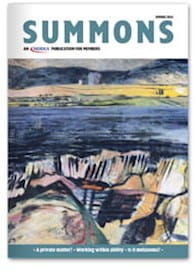Traditionally, and as one might expect, academics have assessed and therefore rewarded a particular form of engagement with ethics which is largely intellectual. Those who could demonstrate an ability to absorb moral theories and apply analytic tools and models to complex ethical questions or problems were successful. The traditional essay and other long-form written exercises endure because they afford authors an opportunity to develop, refine and show that they have acquired knowledge and skills in analysis and argument.
I believe, like the majority of my academic colleagues, that such assessments continue to be an effective way to explore someone’s facility for conceptual thinking, their aptitude for interrogating ideas and ability to construct a logical argument. However, I also believe that those who achieve the highest marks in these sorts of tasks are not necessarily the best, or even “good”, at ethics. Yes, they are skilled in some aspects of the subject, but what does that mean for ethical practice in a career that may span a further 40 years?
Most medical schools and postgraduate exams have a practical component in which clinical interactions are simulated to assess how candidates behave with patients (or those playing the role of patients). My own institution is no exception. Next month, I will evaluate hundreds of anxious final year medical students as they carry out tasks and conduct consultations with standardised patients in a week of OSCE exams. Despite the uniformity of the teaching the students have had, it is fascinating to see the different ways in which candidates approach a common scenario. The marking system is, as the description of the exam implies, largely objective and structured. However, there is also an expectation that an examiner will use his or her judgement to assess the candidate “globally” and indicate where someone appears to be outstanding.
In nearly 20 years of examining in such assessments, what constitutes an exemplary performance is a question that fascinates me. From a personal perspective, it is when someone does more than simply interact in the ways they have been taught are “correct”. It is when there is demonstrable warmth, attention and responsiveness. It is the candidate who sees the interaction as more than an instruction to, for example, seek consent or assess capacity. Perhaps it is something about sincerity or authenticity. It is someone who is not merely adept at “ethics in practice” but embodies ethical practice by an interest in, and commitment to, those there to be served.
Away from the high-stakes, one-off assessments, there are of course other ways in which we evaluate an individual’s ability in ethics. Daily interactions when working in a clinical team inform end-ofplacement sign-offs and references. Portfolios and reflective exercises are a feature of most training programmes, albeit not always popular. However, again, such exercises are limited in what they can and do capture. Many years ago, I heard the aphorism that “ethics is what you do when no one is watching”. How then do we begin to obtain any insight into what people do when they are unobserved without entering into some Orwellian nightmare of ethical surveillance?
The answer, it seems to me, is to acknowledge that being ethical is both simpler and more complex than any examination or assessment can capture, however well-constructed. It is an inherently human endeavour that will always depend on systems that make it possible to behave well and create cultures in which individuals are valued and value others.
As I came into work this morning, I noticed in the distance, one of the students who will be sitting my carefully-crafted ethics examinations as part of his clinical finals next month. He looked tired and the early hour suggested he had just finished a night-shift as part of his last AHO placement. A short distance ahead of him, an elderly woman was leaning heavily on her walking frame and appeared confused, maybe even distressed.
I watched as the student stopped and gently led the woman to a nearby seat. He sat next to her and, as I approached, I heard him ask how he could help her. He didn’t notice me, so focused was he on listening to this frail woman. And I knew I had just seen someone who was “good” at ethics.
Deborah Bowman is Professor of Bioethics, Clinical Ethics and Medical Law at St George’s, University of London
From Summons Spring 2014, p 9
Summons Spring 2014
Click here for PDF of this issue of Summons
This page was correct at the time of publication. Any guidance is intended as general guidance for members only. If you are a member and need specific advice relating to your own circumstances, please contact one of our advisers.
Read more from this issue of Insight

Save this article
Save this article to a list of favourite articles which members can access in their account.
Save to library